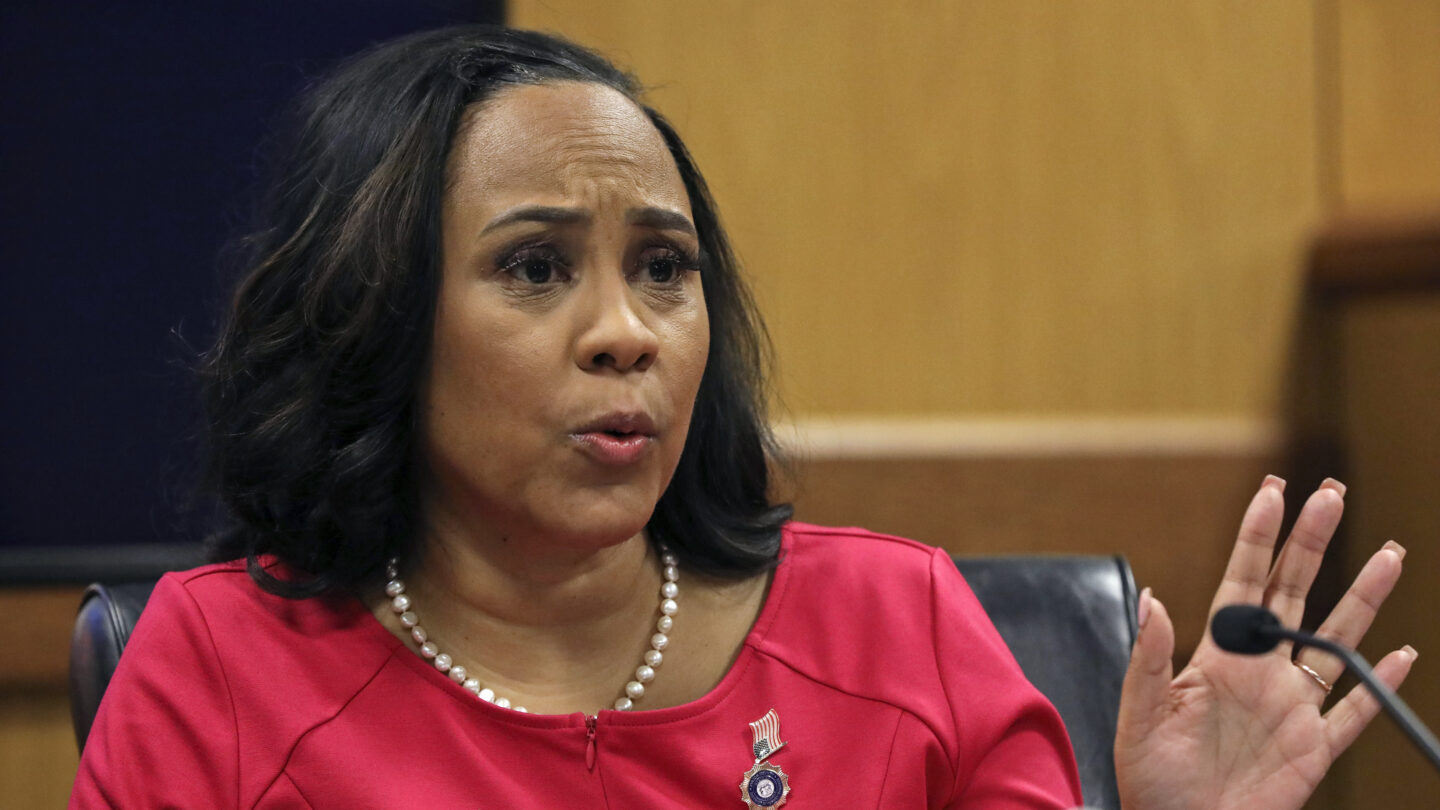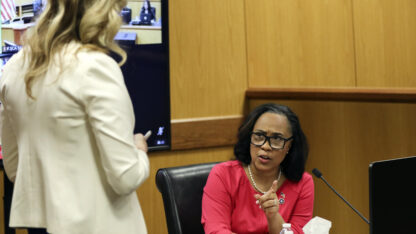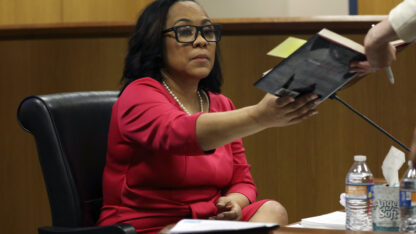Georgia prosecutors sought to knock down misconduct allegations against Fulton County District Attorney Fani Willis on Friday, calling her father to the witness stand to testify about his knowledge of her romantic relationship with the special prosecutor she hired to lead Donald Trump’s case.
On the second day of an extraordinary hearing that could result in Willis and her office being removed from the case against the former president, Willis’ father, John Clifford Floyd III, testified that he had not met special prosecutor Nathan Wade until last year and didn’t find out until weeks ago that they had been in a relationship. Defense attorneys have been trying to show that the romantic relationship existed before Willis hired Wade.
Prosecutors also sought to bolster Willis’ testimony that Wade was not the district attorney’s first choice to lead the case against Trump. Former Georgia Gov. Roy Barnes testified that Willis approached him in 2021 about serving as special prosecutor, but that he turned it down in part because he had “mouths to feed” at his law practice and because he was concerned about potential threats of violence that could come with the job.
The hearing, with testimony about cash stashes in homes, romantic dalliances and vacations to exotic locales, lent a soap opera feel to one of the most politically consequential prosecutions ever initiated by a county district attorney. Thousands watched a livestream of the proceedings, even during tedious lawyerly exchanges about legal theory, while some prominent local figures — including Atlanta’s current mayor — dropped in to witness the hearing in person.
Yet despite the public intrigue and the potential to undermine the integrity of the case, it was far from clear by midday Friday that defense lawyers had succeeded in presenting indisputably persuasive evidence to push Willis or Wade out of the prosecution.
Wade’s former law partner and divorce attorney, Terrence Bradley, was described by the defense as a key witness who would testify that Willis and Wade began dating before Wade was hired. There have been differing accounts about when the relationship began. Wade and Willis have said they didn’t start dating until 2022, but a former Willis friend and co-worker testified Thursday that she saw them hugging and kissing before Wade was hired in November 2021.
Bradley repeatedly refused to answer questions about Wade and Willis, citing attorney-client privilege. But he did acknowledge texting with the defense attorney who first revealed the existence of Willis and Wade’s relationship.
Prosecutors opted not to put Willis back on the witness stand on Friday, avoiding the spectacle of more deeply personal testimony from the district attorney. On the witness stand Thursday, Willis forcefully pushed back against any suggestion that her relationship with Wade created a conflict of interest and accused a defense attorney of trying to smear her with salacious lies in an effort to discredit the case against Trump. Willis and Wade have both acknowledged they were in a relationship but say their personal lives have no bearing on their ability to prosecute the case.
Even if the allegations don’t derail the case, they threaten to taint the public’s perception of one of four criminal proceedings facing the former president, and have provided an opening for Trump and his Republican allies to try to cast doubt on the case’s legitimacy as he vies to reclaim the White House in November.
Trump immediately jumped on the allegations in hopes of discrediting the entire case, part of a yearslong pattern of deflecting attention away from his own conduct by highlighting the personal lives and lapses in judgment — both perceived and real — of the officials investigating him. His use of the word “lover” to refer to Wade echoed his attacks years earlier on two FBI officials who had an extramarital relationship and exchanged derogatory text messages about him during the FBI’s investigation into Russian election interference.
Willis and Wade’s relationship was first revealed by Merchant, an attorney for Trump co-defendant Michael Roman, a former campaign staffer and onetime White House aide. Merchant has alleged that Willis personally profited from the case, paying Wade more than $650,000 for his work and then benefiting when Wade used his earnings to pay for vacations the pair took together.
Wade testified that he and Willis took trips together, but said Willis paid him back in cash for some expenses that he had charged to his credit card. Defense attorneys have sought to cast doubt on the claim that Willis paid Wade in cash, pressing both of them on why Willis would use cash and if they had any evidence that she paid him with it.
Floyd, Willis’ father, seemed to support his daughter’s assertion that she keeps large amounts of cash at home with his testimony that he always told his daughter to have six months of cash on hand.
“It’s a Black thing,” Floyd said. “Most Black folks, they hide cash, they keep cash.”
It’s unclear when the judge might rule on whether Willis and her office should be disqualified from the case. Judge Scott McAfee said during a hearing Monday that Willis could be disqualified “if evidence is produced demonstrating an actual conflict or the appearance of one.”
Willis’ removal would be a stunning development in the most sprawling of the criminal cases against Trump. If she were disqualified, a council that supports prosecuting attorneys in Georgia would need to find a new attorney to take over. That successor could either proceed with the charges against Trump and 14 others or drop the case altogether. Even if a new lawyer went forward with the case, it would very likely not go to trial before November, when Trump is expected to be the Republican nominee for president.
Willis and Wade’s relationship was first revealed by Merchant, an attorney for Trump co-defendant Michael Roman, a former campaign staffer and onetime White House aide. Merchant has alleged that Willis personally profited from the case, paying Wade more than $650,000 for his work and then benefiting when Wade used his earnings to pay for vacations the pair took together.
____ Alanna Richer reported from Boston. Associated Press writer Adriana Gomez Licon in Miami contributed to this report.









